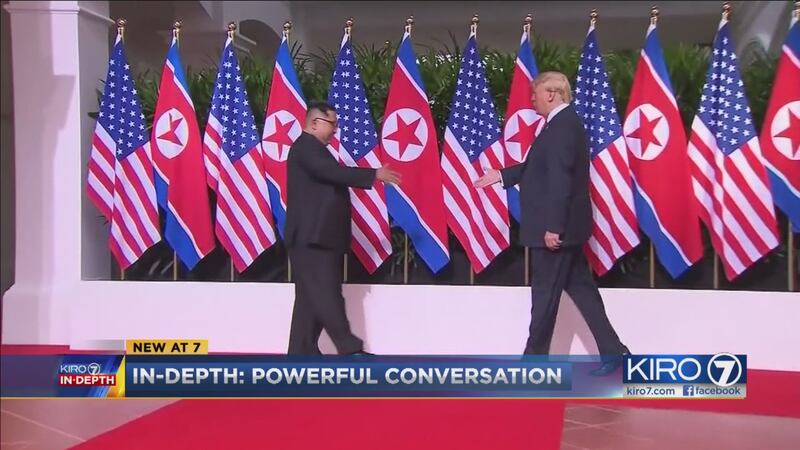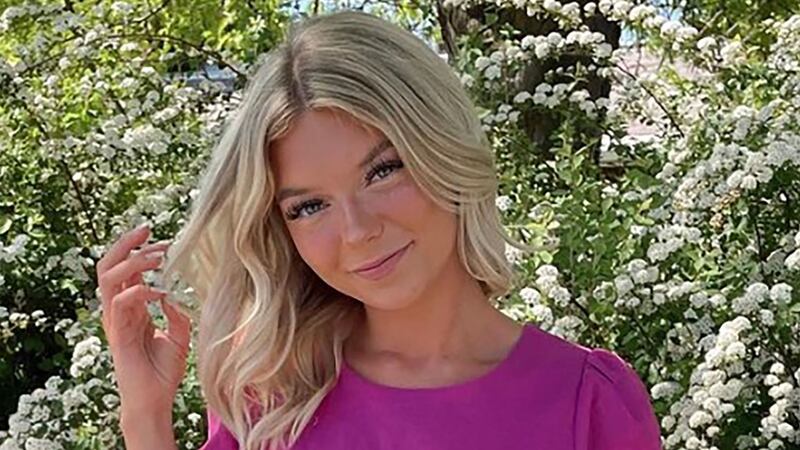SEATTLE — A new chorus of voices is being heard after the historic summit in Singapore. Some say they are thrilled with this meeting, believing it could open doors for family to visit, to improve conditions in the Korean Peninsula.
What they have in common is that nobody knows how this will ultimately play out. But they still believe the meeting between these President Donald Trump and North Korean leader Kim Jong Un, even though one of them is a ruthless dictator, is a great first step.
Scroll down to continue reading
More news from KIRO 7
- Seattle homeless and the head tax: See timeline to the City Council's repeal
- Two dead in head-on crash on Highway 2
- North Korea summit: Watch the dramatic video that Trump played for Kim Jong Un
- As many as 20 people displaced after Redmond condo fire
- Family of 5 killed in Jefferson County explosion, fire
Al Simpson looked at a map of the divided Korea, a map he bought in 1954. It is one of the few artifacts he still has from the war on that peninsula that began nearly 70 years ago. Just 17 when he enlisted in the Marines, Simpson was part of the military forces that fought to keep South Korea Democratic and free.
His service is still a source of pride.
"I thought it was probably one of the best things I ever did," he said. "I really do."
But the war has never ended. And many of the allied troops who died defending South Korea died in the communist North. Their bodies have never been brought home. Now the sight of Trump and Kim extending a hend past decades of hostilities gives him hope.
"Maybe they'll allow somebody to go up there and bring some of these people back," he said.
"I think it's amazing," said Grace Kim.
Kim arrived in the U.S. from Seoul, South Korea, when she was 18. She sees the summit as a hopeful sign for reconciliation.
"Something that nobody thought that this could happen," she said. "Yes, yes. It was so positive."
Kim chairs the board at the Korean Women's Association, an organization that serves many people born in Korea who left behind family in the South and the North. Many of them by now elderly.
"They want to be able to unite," Kim said, "at least have freedom to visit with them, just know how they're doing, if they're still alive."
Kim says she doesn't have family members on both sides of the divide.
"I do not personally," she said. "But I hear from people who are still devastated."
Korea expert Dr. Richard Ellings, president of the National Bureau of Asian Research, sees the summit as a first step toward the promise of a more peaceful Korea.
"We'll have to see what might come out," he said.
He theorizes the talks are designed to calm the jitters of North Korea from the ever-present threat from the country that has long been its only ally in the world: a still fast-growing China.
"They know on a daily basis," he said, "the last thing that's going to happen is the South Korean or U.S. invasion of the North that's unprovoked."
Moreover, Ellings argues, the U.S. wants to keep China at bay, too.
"The North having a nuclear deterrent that can deter China and keep China from dominating the north in the peninsula is in our interest," he said. "Because shorn of its nuclear deterrent, China can walk into North Korea anytime it wants.
All of it is beyond Al Simpson. He just has a simple desire: freedom for the citizens of Korea, both North and South.
"Well, I'd like to think that could happen," he said, "maybe not in my lifetime. Hell, I'm 85 years old. I don't have that much time left. But I would like to see some of the start of it anyway."
As he says, that is unlikely to happen anytime soon. But all three of them agree that what happened in Singapore has the potential to change the world for the better for a lot of people.
Cox Media Group








